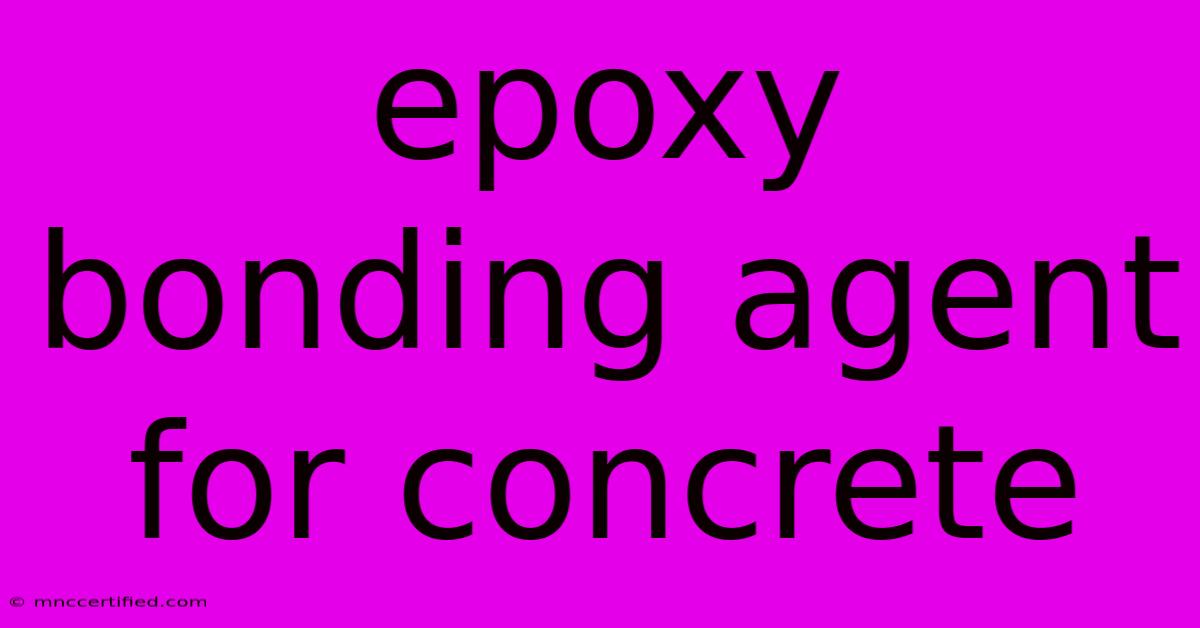Epoxy Bonding Agent For Concrete

Table of Contents
Epoxy Bonding Agent for Concrete: A Comprehensive Guide
Epoxy bonding agents have revolutionized concrete repair and construction, providing superior adhesion and strength compared to traditional methods. This comprehensive guide explores everything you need to know about epoxy bonding agents for concrete, from their applications to selection and proper usage. We'll delve into the benefits, drawbacks, and best practices to ensure successful projects.
What is an Epoxy Bonding Agent?
An epoxy bonding agent is a two-part adhesive system consisting of a resin and a hardener. When mixed, these components create a strong, durable bond between concrete surfaces, or between concrete and other materials like steel or masonry. Unlike cementitious bonding agents, epoxies offer superior chemical resistance, higher tensile strength, and better performance in wet or damp conditions. This makes them ideal for demanding applications.
Key Characteristics of Epoxy Bonding Agents:
- Superior Adhesion: Epoxies bond exceptionally well to various substrates, including damp or slightly oily concrete.
- High Strength: They possess significantly higher tensile and compressive strength than many other adhesives.
- Chemical Resistance: Epoxy bonds are resistant to many chemicals, making them suitable for harsh environments.
- Durability: Epoxy bonds offer long-lasting performance, even under heavy loads and stress.
- Versatility: They can be used for a wide range of applications, from crack repair to anchoring.
Applications of Epoxy Bonding Agents for Concrete:
Epoxy bonding agents find extensive use in various concrete-related projects, including:
- Concrete Repair: Repairing cracks, spalling, and other surface damage.
- Overlays: Creating a strong bond between new concrete overlays and existing slabs.
- Anchoring: Securing rebar, bolts, and other fixtures into concrete.
- Grouting: Filling gaps and voids in concrete structures.
- Tile Installation: Providing superior adhesion for tile installations on concrete substrates.
- Structural Strengthening: Improving the overall strength and stability of concrete structures.
Choosing the Right Epoxy Bonding Agent:
Selecting the appropriate epoxy bonding agent depends on the specific application and project requirements. Consider these factors:
- Substrate Condition: The condition of the concrete surface will determine the type of primer and epoxy needed. Damp or oily surfaces might require specialized primers.
- Application Method: The method of application (e.g., brushing, spraying, troweling) will influence the choice of epoxy viscosity.
- Temperature: Extreme temperatures can affect the curing process of epoxy, so select a product suitable for your climate.
- Service Conditions: The intended use of the bonded surface (e.g., chemical exposure, heavy loads) dictates the required epoxy strength and chemical resistance.
- Pot Life: The pot life, or working time, of the epoxy is crucial for large projects. Choose an epoxy with a pot life suitable for your project's scale.
Best Practices for Using Epoxy Bonding Agents:
Proper surface preparation is critical for successful epoxy bonding. Follow these best practices:
- Clean the Surface: Remove all loose debris, dust, oil, grease, and curing compounds from the concrete surface. Use a wire brush, grinder, or pressure washer as needed.
- Prime the Surface (if necessary): Apply a suitable epoxy primer to enhance adhesion, especially on porous or damp surfaces.
- Mix the Epoxy: Follow the manufacturer's instructions carefully when mixing the resin and hardener. Thorough mixing is essential for proper curing.
- Apply the Epoxy: Apply the epoxy evenly to the prepared surfaces using a brush, roller, or trowel, depending on the application.
- Cure Time: Allow sufficient curing time before applying any further loads or stresses. Refer to the manufacturer's instructions for specific curing times.
- Safety Precautions: Always wear appropriate personal protective equipment (PPE), including gloves, eye protection, and respiratory protection, when working with epoxy bonding agents.
Epoxy Bonding Agent vs. Other Concrete Adhesives:
While other bonding agents exist, epoxy offers distinct advantages:
| Feature | Epoxy Bonding Agent | Cementitious Bonding Agent |
|---|---|---|
| Strength | High | Moderate |
| Chemical Resistance | High | Low |
| Water Resistance | Excellent | Moderate |
| Curing Time | Faster | Slower |
| Cost | Generally Higher | Generally Lower |
Conclusion:
Epoxy bonding agents are powerful tools for a wide range of concrete repair and construction applications. By understanding their properties, applications, and proper usage, you can ensure successful projects with long-lasting, durable results. Remember to always consult the manufacturer's instructions for specific product details and safety information. Choosing the right epoxy bonding agent and following best practices will yield superior results and maximize the lifespan of your concrete projects.

Thank you for visiting our website wich cover about Epoxy Bonding Agent For Concrete. We hope the information provided has been useful to you. Feel free to contact us if you have any questions or need further assistance. See you next time and dont miss to bookmark.
Featured Posts
-
Prize Rejected Fossil Fuel Concerns
Nov 20, 2024
-
Richard Flanagans Double Win
Nov 20, 2024
-
Alpha Trading Investments Limited
Nov 20, 2024
-
Smiths Take Marquettes Solid Defense
Nov 20, 2024
-
Best Investment In Uae For Expats
Nov 20, 2024